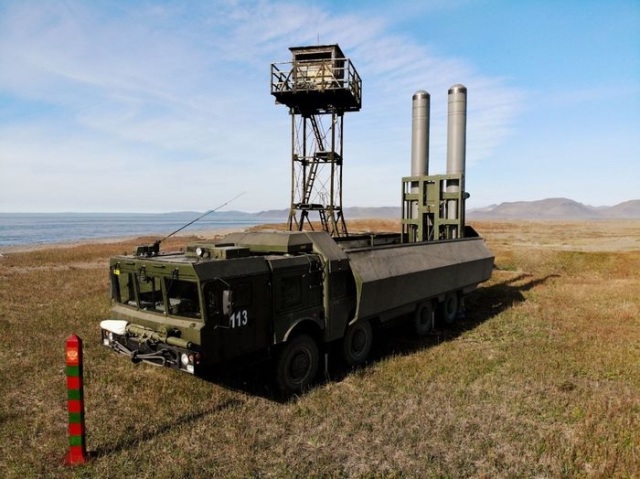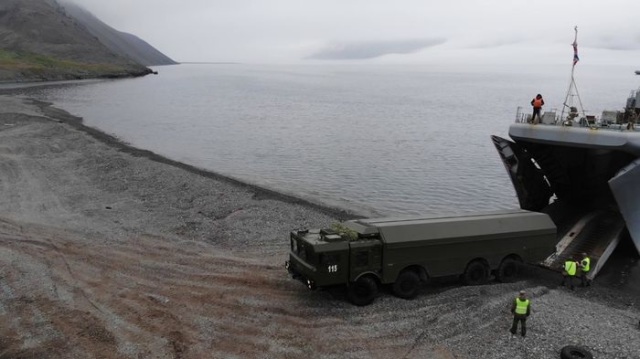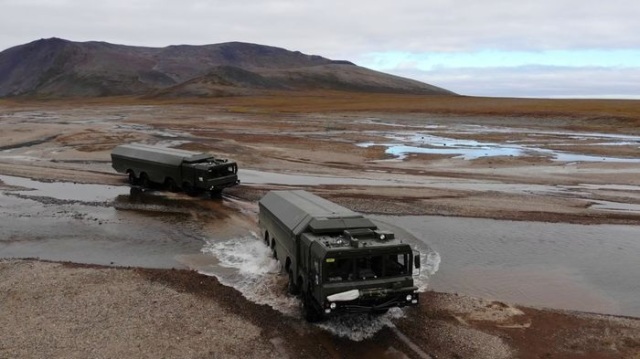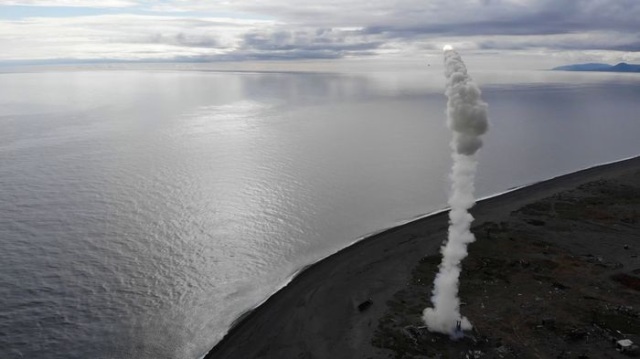The newspaper of the Ministry of defense of the Russian Federation "Krasnaya Zvezda" published interesting material by Yuri Rossolov "Kamchatka Bastion" hits without a miss. Coastal rocketeers from the edge of volcanoes conducted a unique shooting in the Arctic latitudes" on the combat training of calculations of the mobile coastal missile system 3K55P "Bastion-P" from the 520th separate coastal missile and artillery brigade of the Coastal forces of the group of Troops and forces in the North-East of Russia of the Pacific fleet stationed in Kamchatka. Recall that the mobile coastal missile system 3K55P Bastion-P with the 3m55 onyx supersonic missile was developed and manufactured by JSC MIC NPO mashinostroeniya, which is a part of JSC Tactical missile weapons Corporation (KTRV).

3c55 self-propelled launcher from the 3k55p mobile coastal anti-ship missile system Bastion-P ,part of the 520th separate coastal missile and artillery brigade of the Coastal forces of the group of Troops and forces in the North-East of Russia of the Pacific fleet (C) Yuri Rossolov / Krasnaya Zvezda"
The first launch battery of the first division of the mobile coastal missile system (pbrk) "Bastion" of the Kamchatka separate coastal missile and artillery brigade is competing for the title of shock and the Cup of the commander-in-chief of the Russian Navy. The unit, headed by captain Ivan Prokhorov, was nominated for the honorary title and trophy not by chance. In the final academic year, the battery adequately passed the exam in all types of training, and also performed a unique practical rocket launch in the Arctic latitudes of the Pacific fleet's area of responsibility.
Over the past four years - since the formation of the Kamchatka division - the first starting battery of the pbrk "Bastion" occupies a leading position in the brigade. The personnel of the unit has made significant progress in the development and practical use of the latest weapons. It is not surprising that captain Prokhorov's subordinates are trusted to perform the most complex and responsible tasks both in the area of responsibility and beyond - in areas where Russia defends its geopolitical interests. A separate page in the history of the battery is a trip to the Arctic circle.
- Since the division was formed, our battery has been in Autonomous training in the Arctic latitudes three times, - captain Ivan Prokhorov emphasizes with some pride. - And each time we justified the trust placed in us.
Captain Prokhorov calls trips to the Far North "Autonomous" not by chance, because in each such case, his unit operates literally in isolation from civilization - in wild places where there are no roads, other infrastructure, where there is practically no stable communication, where you have to rely solely on your own strength and what you took with you.
- The most difficult thing in such training events is to prepare for them, - says captain Ivan Prokhorov. - Everything must be thought out so that nothing prevents you from completing the task. Therefore, we paid attention to any little things, including in everyday life. After all, the battery, as a rule, moved to new areas not for a day or two, but for a long time.
After several years, the personnel of the first launch battery worked out the issue of preparing for business trips to the absolute. The accumulated experience is systematized, as a result, the unit of captain Prokhorov always went to conquer the Arctic latitudes of the zone of responsibility in the literal and figurative sense fully armed.
According to the plan of the maneuvers, which took place as part of the exercise with the grouping of forces in the far sea zone under the leadership of the commander of the Pacific fleet, the first launch battery was divided into two strike groups. Each of the experimental mobile detachments included: a launcher, a transport-loading vehicle, an BTR-82A, and a marine detachment.
Having made a multi-day crossing by sea, the Kamchatka rocket men landed on the unequipped coast and immediately made a seventy-kilometer March into the interior of the territory. The route of the column passed through rough terrain, in some places along the stone beds of dried-up rivers. Here, everyone relied on the skill of the driver mechanics and the reliability of the equipment. Both the iron multi-ton monsters and the specialists who manage them did not let them down. Driver mechanics have already had experience in these areas, and in more difficult weather conditions-in winter. So the column reached the specified area without incident.
Arriving at the site, the expeditionaries began to set up a field camp, starting and reserve positions, and identified areas of combat maneuvering.
A distinctive feature of the mobile coastal missile system "Bastion" is its ability to perform tasks far from the water's edge, while being under the cover of terrain folds. The high efficiency of the pbrk in such conditions, the first starting battery of captain Prokhorov confirmed last year and entered the Book of records of the Armed Forces of the country. Then the rocket men from the edge of volcanoes were the first in Russia to shoot from the Western hemisphere and at the maximum distance from the coastline at that time. However, the limit of the complex in the corresponding indicator has not yet been reached. This means that the Kamchatka masters of missile strike have something to strive for, especially since Other Bastion capabilities have not yet been fully revealed. But the personnel of the battery of captain Prokhorov is moving in this direction by leaps and bounds. And a vivid example of this is the teaching in question.
One of the strike groups was assigned the task of firing missiles from the depth of the territory at a target located in the sea.
- The peculiarity of this shooting was that we complicated the flight task of the rocket, - says captain Ivan Prokhorov. - In other words, they set the winged projectile a trajectory along which it should safely pass all the folds of the terrain and reach a direct bearing on the target.
Up to this point, none of the coastal formations of the Russian armed forces armed with the Bastion pbrk had ever solved such a problem. Therefore, the Kamchatka missile strike masters were well aware of the responsibility that was assigned to them and what results were expected from them. But captain Prokhorov's subordinates are no strangers to being pioneers. As we have already said, they had experience of combat work in the Arctic latitudes, and the new nuance in rocket shooting only fueled their interest and became a kind of challenge to the professionalism of rocket scientists, they had no right to take risks.
As a result, the experiment ended with the triumph of the personnel of the first launch battery. The missile completed its flight task in a filigree manner, entered the strategic expanse and hit a surface target, which was confirmed by means of objective control.
According to captain Prokhorov, this success is the merit of many, because, as you know, rocket weapons are collective. Nevertheless, the last word still belongs to the crew of the launcher. The final result depends on how professional each number of the combat crew is and how the material part is prepared.
In this episode of the doctrine was the lead combat crew under the command of Lieutenant Alexei Tomycine. All numbers of the unit, which is considered one of the best in the division and the unit as a whole, have served in the battery since its formation. However, as well as the rest of the personnel of the unit. The lack of turnover is one of the keys to the success of the battery, which is commanded by captain Ivan Prokhorov.
In the first starting battery there is a backbone-military personnel on whom the commander can rely in everything. Therefore, the last few years, work in the team (as captain Prokhorov jokes) is based on the "principle of a cruise missile": ordered-forgotten. Unconditional trust, exemplary performance.
As in any strong military team, the battery has its own masters-professionals with a capital letter and old-timers of the compound-to whom captain Prokhorov does not hesitate to ask for advice and help.
-The entire material part of the battery is held by the chief of the missile transportation calculation, senior Sergeant Oleg Saraykin, and senior technician - operator, senior ensign Sergei Parovik, - says captain Ivan Prokhorov. - Sergey Parovik can rightly be called the guru of a missile strike. On his account, more than thirty launches - this is an absolute record of the country's Armed Forces.
Among the leaders is also a technician-operator, senior ensign Talgat Adrshin, who, according to the commander, is not only an excellent specialist, but also an excellent business Manager. Thanks to his efforts, promptness and care, the battery personnel never experienced any domestic inconveniences on business trips, even in the middle of the tundra in the Arctic latitudes. Rocket men always took food in comfortable conditions, and also met hygiene needs in an improvised bath with a steam room.
Special words of appreciation were also given to the driver mechanics, senior seaman Sergey Antonov and seaman Roman Kusmanbetov, with whom captain Prokhorov drove hundreds of kilometers on mountain slopes and on untrodden tundra. The military personnel who manage multi-ton eight-wheeled iron monsters have never given reason to doubt
in their professionalism.
Over four years of hard work, the battery's personnel have achieved almost absolute coherence and mutual understanding.
The fact that none of the military personnel will remember when the unit commander last raised his voice at them also speaks volumes about the microclimate here.
The generator of a healthy atmosphere in the battery is, of course, the commander, who always and everywhere acts on the principle of "do as I do". And this applies to all types of training. If you need to pass the standard for rkhbz, captain Ivan Prokhorov does it first, and traditionally for an "excellent" rating. There is a test of physical fitness - the commander is in the vanguard, sets the tone for everyone and serves as an example to each individual. And he has a lot to learn. Officer and runs so that only keep up with him. And he pulls up on the crossbar so many times that any professional athlete will envy. His personal best in this discipline is 40 pull-UPS.
Such a commander can't have bad subordinates a priori. This was confirmed by the final check, when the battery personnel passed the standards for confirming the rank of shock. All tests were passed with honor, and now the battery is waiting for the verdict. At the same time, documents were prepared and sent for the prize of the commander-in-chief of the Russian Navy: the unique shooting of Kamchatka rocket men in the Arctic circle could not go unnoticed. Captain Ivan Prokhorov and his subordinates are confident of their success, especially since last year they already won the honorary Cup and know what price it comes at. In any case, the Kamchatka masters of the missile strike left a bright mark at the end of the year, which will certainly be reflected in further training and combat work and will serve as another starting point for new victories and achievements of the entire brigade.
Petropavlovsk-Kamchatsky



3c55 self-propelled launchers from the 3k55p mobile coastal anti-ship missile system Bastion-P ,part of the 520th separate coastal missile and artillery brigade of the Coastal forces of the group of Troops and forces in the North-East of Russia of the Pacific fleet (C) Yuri Rossolov / Krasnaya Zvezda"
